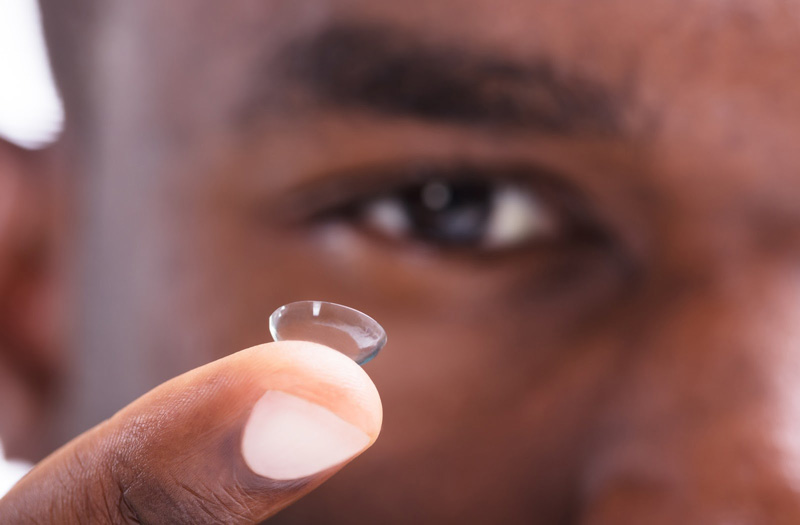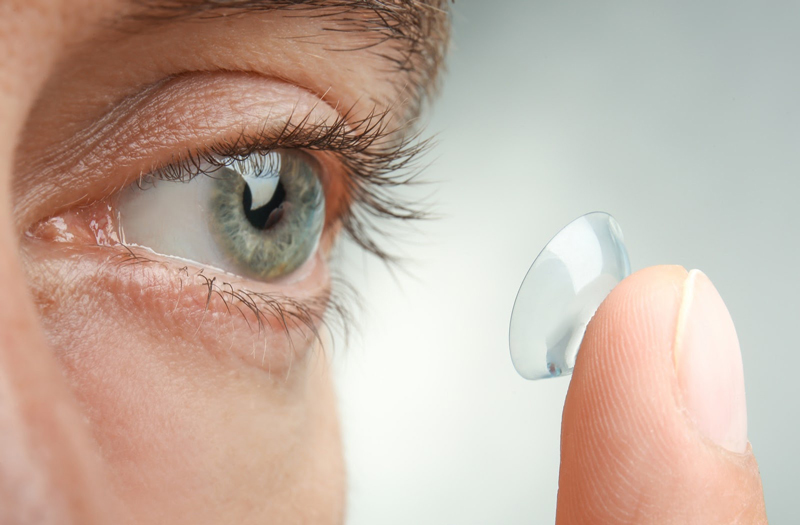
If you do not want to wear eyeglasses, contact lenses are a great option. However, general contacts are not for everyone, and you may need specialty contacts if you have particular health conditions or difficult-to-fit eyes.
If you are unfamiliar with these contact lenses, consider this your guide to our specialty contact lenses, including what they are, how they work, and how to know which lenses are best for you.
What are Specialty Contact Lenses?
Your contacts are more complicated than you think. Many may assume contact lenses are limited to the standard, normal variant, but this product can be customized to suit each individual’s needs. They can differ in material, size, design, features.
Depending on your condition, you may need contact lenses to provide both vision correction and other health benefits. For example, some require contacts to correct their farsightedness and also treat their chronic dry eye.
There are several specialty contact lenses for people with particular health conditions or hard-to-fit eyes. Some of the specialty lenses we carry include:
- Scleral contact lenses
- Toric contact lenses
- Hybrid contact lenses
If regular contact lenses are not working for you, how do you know if specialty lenses are for you? Let’s look at the types of specialty lenses we carry, what they are, how they work, and how to know which variety you need.
Scleral Contact Lenses
Scleral lenses are a specialty contact lens which covers a larger area than traditional contact lenses. This variety is designed to vault over the entire corneal surface and can help make an irregular cornea into a smooth area. The space between the cornea and the back of the scleral lens works to continuously moisten the cornea, which can provide relief and may help the eye’s surface to heal.
Scleral contact lenses can be designed for any degree of irregular or steep cornea, and provide better stability than corneal lenses. Some may find these lenses more comfortable than traditional lenses because they rest on the sclera rather than the corneal tissue.
These lenses are usually prescribed to patients suffering from dry eye disease due to the lens’s ability to continually moisturize the eye. There are several conditions your optometrist may prescribe scleral contact lenses for, including:
- Dry eye
- Astigmatism
- Keratoconus
- Sjogren’s syndrome
- Corneal irregularities
- Graft versus host disease
- Stevens-Johnson syndrome
- Recovery from a corneal transplant
Toric Contact Lenses
Toric contact lenses are designed for people suffering from astigmatism. This condition usually causes the cornea to be irregularly shaped and wearing contact lenses may be difficult. Every eye affected by astigmatism is unique, so there is no uniform way for these lenses to be designed.
With toric contact lenses, there are different corrective powers in different areas of the lens. Toric lenses provide differing corrective powers for different horizontal and vertical planes of the lens, and this makes lens positioning vital.
There is always the chance your contact lens will shift when you are wearing them. Whatever the reason for your lens moving, toric lenses protect your vision because of their weighted bottom which can automatically correct itself if the lens shifts.
It may take a few attempts to find which toric contact lenses provide you with comfort and corrected vision.

Hybrid Contact Lenses
The hybrid contact lenses we carry aim to bring the benefits of rigid gas permeable (RGP) lenses and soft contact lenses together. RGP lenses are typically more durable than soft contact lenses, provide more resistance to build-up, and provide you with clearer vision. While they are easier to handle, they are not as comfortable to wear.
Soft contact lenses are one of the most commonly worn types of lenses. They are made of flexible plastic which allows oxygen to pass through to the cornea. Soft contacts are more comfortable than RGP contact lenses and they are easier to adjust to.
Hybrid contact lenses provide crisp, clear vision with its rigid gas permeable center, and it also provides comfort with a soft area around the center of the lens. These lenses provide the “best of both worlds” when it comes to contact lenses, and they may be recommended if you live with any of the following:
- Astigmatism
- Presbyopia
- Keratoconus
- Corneal transplant recovery
- Corneal irregularities
It’s important to learn about the different contact lens options you may have before speaking with your optometrist, but how do you know which contact lenses are best suited for you?
How Do I Choose the Best Contact Lenses?
Your optometrist can help you make an informed decision. Depending on your unique conditions, there are a few factors to consider when looking for the right lenses, such as:
- Vision
- Fit
- Medical need
- Preference
This is obvious, but your contact lens should allow you to see clearly. Your optometrist can help you ensure you have the proper corrective power for your contact lenses. Next, your lenses must properly fit your eye. There are many different lens combinations, and you need the correct diameter and curvature.
Your medical needs are next and your eye care provider will help you pick the correct lens type if you have a refractive error alongside an eye condition. Finally, your personal preference may determine what type of contact lenses you get.
No matter what contact lenses you may need, we can help you make the best choice for your long-term vision and comfort.
Find the Right Contact Lenses for You
Proper eyesight is important for your quality of life, and contact lenses can help you. If regular contacts are not helping, contact us and we can help you find the right lenses for your unique needs.



 Dr. Kapadia originally hails from St. Catharines, Ontario, Canada where he earned his Bachelor of Arts degree from Brock University. He then went on to graduate with honors from the Michigan College of Optometry in 1998, where he specialized in contact lenses. After he graduated, Dr. Kapadia completed a one-year residency at the renowned Bascom Palmer Eye Institute in Miami, Florida, where he focused on ocular diseases.
Dr. Kapadia originally hails from St. Catharines, Ontario, Canada where he earned his Bachelor of Arts degree from Brock University. He then went on to graduate with honors from the Michigan College of Optometry in 1998, where he specialized in contact lenses. After he graduated, Dr. Kapadia completed a one-year residency at the renowned Bascom Palmer Eye Institute in Miami, Florida, where he focused on ocular diseases. Dr. Kapadia graduated with honors from the Michigan College of Optometry in 1999, where she received the Wesley-Jessen award for Outstanding Work in Contact Lenses. During her studies, she also served as President of Student Volunteer Optometric Services to Humanity (SVOSH), which works to improve the sight of millions of people in developing countries.
Dr. Kapadia graduated with honors from the Michigan College of Optometry in 1999, where she received the Wesley-Jessen award for Outstanding Work in Contact Lenses. During her studies, she also served as President of Student Volunteer Optometric Services to Humanity (SVOSH), which works to improve the sight of millions of people in developing countries. After growing up in Minersville, Pennsylvania, Dr. Price graduated from Susquehanna University in 2012 with a Bachelor’s Degree in Biology. Dr. Price continued her education at the Pennsylvania College of Optometry and completed her training in 2016. After graduation, Dr. Price spent her career studying advanced eye diseases and specialized Low Vision services and devices.
After growing up in Minersville, Pennsylvania, Dr. Price graduated from Susquehanna University in 2012 with a Bachelor’s Degree in Biology. Dr. Price continued her education at the Pennsylvania College of Optometry and completed her training in 2016. After graduation, Dr. Price spent her career studying advanced eye diseases and specialized Low Vision services and devices. Dr. Morgan Kickliter grew up in Hendersonville, Tennessee.
Dr. Morgan Kickliter grew up in Hendersonville, Tennessee. Dr. Phillips earned his Bachelor of Science in Chemistry at the University of Georgia before achieving his Doctor of Optometry from the Southern College of Optometry. There, he served as Vice President of the Georgia Optometric Student Association and provided free and cost-reduced optometric care to underserved patients in Mexico and Belize with the Student Volunteer Optometric Services to Humanity. He served his residency at Gainesville Eye Associates, focusing on ocular diseases.
Dr. Phillips earned his Bachelor of Science in Chemistry at the University of Georgia before achieving his Doctor of Optometry from the Southern College of Optometry. There, he served as Vice President of the Georgia Optometric Student Association and provided free and cost-reduced optometric care to underserved patients in Mexico and Belize with the Student Volunteer Optometric Services to Humanity. He served his residency at Gainesville Eye Associates, focusing on ocular diseases.